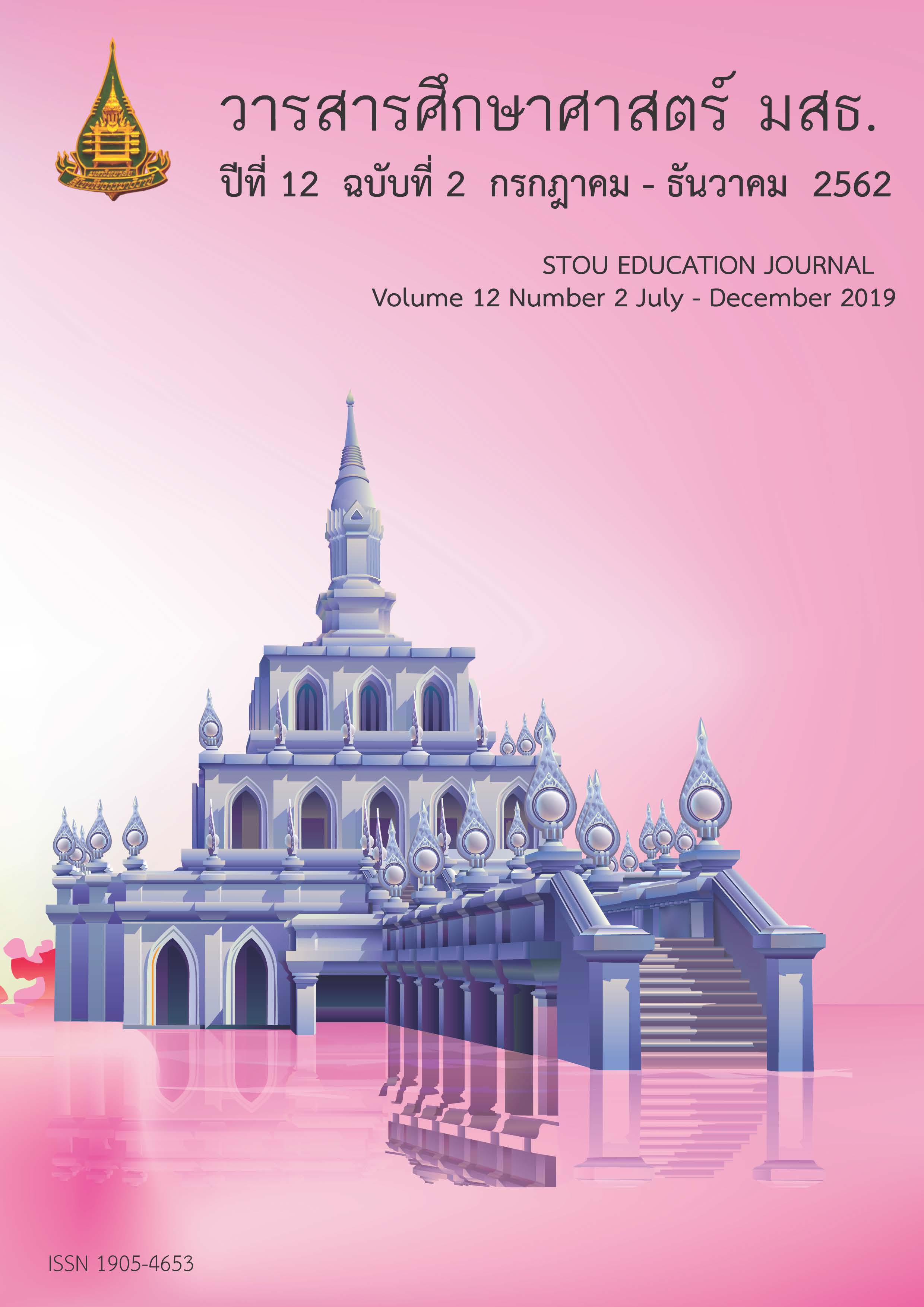การพัฒนาตัวชี้วัดสมรรถนะหลักของอาจารย์เพื่อส่งเสริมให้นักศึกษาสำเร็จการศึกษา ปริญญาโท สาขาวิชาศึกษาศาสตร์ มหาวิทยาลัยสุโขทัยธรรมาธิราช
Main Article Content
บทคัดย่อ
การวิจัยครั้งนี้ มีวัตถุประสงค์เพื่อ 1) สร้างตัวชี้วัดสมรรถนะหลักของอาจารย์เพื่อส่งเสริมให้นักศึกษาสำเร็จการศึกษาปริญญาโท สาขาวิชาศึกษาศาสตร์ มหาวิทยาลัยสุโขทัยธรรมาธิราช และ 2) ตรวจสอบคุณภาพตัวชี้วัดสมรรถนะหลักของอาจารย์เพื่อส่งเสริมให้นักศึกษาสำเร็จการศึกษาปริญญาโท สาขาวิชาศึกษาศาสตร์ มหาวิทยาลัยสุโขทัยธรรมาธิราช ผู้ให้ข้อมูลหลัก ได้แก่ 1) ผู้ทรงคุณวุฒิ จำนวน 15 คน 2) อาจารย์สาขาวิชาศึกษาศาสตร์ จำนวน 45 คน และ 3) ผู้สำเร็จการศึกษาจากสาขาวิชาศึกษาศาสตร์ ปีการศึกษา 2554 – 2559 จำนวน 303 คน ได้มาโดยการสุ่มแบบแบ่งชั้น เครื่องมือที่ใช้ในการวิจัย ได้แก่ แบบสอบถามปลายเปิดและปลายปิดชนิดมาตรประมาณค่า 5 ระดับ และประเด็นการสนทนากลุ่ม การวิเคราะห์ข้อมูล โดยใช้ค่าร้อยละ ค่าเฉลี่ย ส่วนเบี่ยงเบนมาตรฐาน และการวิเคราะห์เนื้อหา ผลการวิจัย พบว่า 1) ตัวชี้วัดสมรรถนะหลักของอาจารย์เพื่อส่งเสริมให้นักศึกษาสำเร็จการศึกษาปริญญาโท สาขาวิชาศึกษาศาสตร์ มหาวิทยาลัยสุโขทัยธรรมาธิราช ประกอบด้วย 6 องค์ประกอบ จำนวน 55 ตัวชี้วัด ได้แก่ องค์ประกอบที่ 1 การจัดการเรียนการสอนทางไกลมี 12 ตัวชี้วัด องค์ประกอบที่ 2 มาตรฐานวิชาชีพครูมี 16 ตัวชี้วัด องค์ประกอบที่ 3 การวิจัยมี 6 ตัวชี้วัด องค์ประกอบที่ 4 การสื่อสารและให้คำปรึกษามี 8 ตัวชี้วัด องค์ประกอบที่ 5 การใช้เทคโนโลยีสารสนเทศมี 4 ตัวชี้วัด และองค์ประกอบที่ 6 การพัฒนาตนเองและสังคมมี 9 ตัวชี้วัด และ 2) ตัวชี้วัดสมรรถนะหลักของอาจารย์เพื่อส่งเสริมให้นักศึกษาสำเร็จการศึกษาปริญญาโท มีคุณภาพด้านความเป็นประโยชน์ ความเป็นไปได้ ความเหมาะสม และความถูกต้อง ในภาพรวมมีคุณภาพอยู่ในระดับมากทุกองค์ประกอบ
Article Details
เอกสารอ้างอิง
ขวัญดาว แจ่มแจ้ง. (2556). กลยุทธ์การพัฒนาสมรรถนะด้านการวิจัยของอาจารย์มหาวิทยาลัยราชภัฏกลุ่มภาคเหนือตอนล่าง. วารสารศึกษาศาสตร์ มหาวิทยาลัยนเรศวร, 15(2), 1-15.
จรัส สุวรรณเวลา. (2551). ความเป็นอิสระของมหาวิทยาลัยไทย. กรุงเทพมหานคร: จุฬาลงกรณ์มหาวิทยาลัย.
บุญศรี พรหมมาพันธุ์ และคณะ. (2560). ความคิดเห็นเกี่ยวกับตัวชี้วัดสมรรถนะของอาจารย์เพื่อส่งเสริมให้นักศึกษาสำเร็จการศึกษาปริญญาโท แขนงวิชาการวัดและประเมินผลการศึกษา สาขาวิชาศึกษาศาสตร์ มหาวิทยาลัยสุโขทัยธรรมาธิราช. นนทบุรี: มหาวิทยาลัยสุโขทัยธรรมาธิราช.
บัวขาว สุขคำ. (2558). การศึกษาเพื่อกำหนดสมรรถนะสำหรับอาจารย์มหาวิทยาลัยเทคโนโลยีพระจอมเกล้าพระนครเหนือ. วารสารวิชาการครุศาสตร์อุตสาหกรรมพระจอมเกล้าพระนครเหนือ, 6(1), 88-96.
ภาสกร เรืองรอง, ประหยัด จิระวงพงศ์, วณิชชา แม่นยำ, วิลาวัลย์ สมยาโรน, ศรันยุ หมื่นเดช และชไมพร ศรีสุราช. (2557). เทคโนโลยีการศึกษากับครูไทยในศตวรรษที่ 21. วารสารปัญญาภิวัฒน์, 5(ฉบับพิเศษ), 95-195.
มหาวิทยาลัยราชภัฏจันทรเกษม. (2558). ความสำคัญของสมรรถนะ. สืบค้นจากhttp://oknation.nationtv.tv/blog/ratchawoot.
มหาวิทยาลัยสุโขทัยธรรมาธิราช. (2558). คู่มือการประกันคุณภาพการศึกษา CUPT QA ของมสธ. ประจำปีการศึกษา 2558-2560. เอกสารอัดสำเนา
มัลลิกา เกตุชรารัตน์, พร้อมพิไล บัวสุวรรณ และวิสุทธิ์ วิจิตรพัชราภรณ์. (2558). การศึกษาสมรรถนะที่พึงประสงค์ของอาจารย์ในมหาวิทยาลัยเกษตรศาสตร์. วารสารครุศาสตร์, 43(1), 112- 127.
วัฒน์ บุญกอบ. (2552). การพัฒนาสมรรถนะที่จำเป็นของอาจารย์มหาวิทยาลัยรามคำแหง . (วิทยานิพนธ์ดุษฎี บัณฑิต ไม่ได้ตีพิมพ์). มหาวิทยาลัยบูรพา, ชลบุรี.
ศิริชัย กาญจนวาสี. (2550). ทฤษฎีการประเมิน. (พิมพ์ครั้งที่ 5). กรุงเทพมหานคร: โรงพิมพ์แห่งจุฬาลงกรณ์มหาวิทยาลัย.
ศูนย์ประสานงานการประกันคุณภาพการศึกษา, มหาวิทยาลัยสุโขทัยธรรมาธิราช. (2557). รายงานการประเมินตนเอง ประจำปีการศึกษา 2556. (1 กรกฎาคม – 30 มิถุนายน 2557).
สาขาวิชาศึกษาศาสตร์ มหาวิทยาลัยสุโขทัยธรรมาธิราช. (2560). ใบรายงานผลการประเมินชุดวิทยานิพนธ์และค้นคว้าอิสระสาขาวิชาศึกษาศาสตร์ มหาวิทยาลัยสุโขทัยธรรมาธิราช ภาคการศึกษาที่ 1 ปีการศึกษา 2559.
________. (2560). หลักสูตรบัณฑิตศึกษาปีการศึกษา 2562. นนทบุรี: โรงพิมพ์มหาวิทยาลัยสุโขทัยธรรมาธิราช.
สำนักงานคณะกรรมการข้าราชการพลเรือน. (2557). คู่มือการกำหนดสมรรถนะในราชการพลเรือน: คู่มือสมรรถนะหลัก. นนทบุรี: บริษัทประชุมช่าง.
สำนักงานคณะกรรมการการศึกษาขั้นพื้นฐาน. (2553). แนวปฏิบัติการวัดและประเมินผลการเรียนรู้ตามหลักสูตรแกนกลางการศึกษา ขั้นพื้นฐาน พุทธศักราช 2551. (พิมพ์ครั้งที่ 2). กรุงเทพมหานคร: โรงพิมพ์ชุมนุมสหกรณ์การเกษตร แห่งประเทศไทย.
สำนักงานคณะกรรมการอุดมศึกษา. (2557). คู่มือการประกันคุณภาพการศึกษาภายใน ระดับอุดมศึกษา พ.ศ. 2557. กรุงเทพมหานคร: สำนักงานคณะกรรมการอุดมศึกษา.
สำนักงานเลขาธิการคุรุสภา. (2560). มาตรฐานวิชาชีพครู. สืบค้นจาก http://www.ksp.or.th/ ksp2013 /profile/index.
สำนักวิชาการ มหาวิทยาลัยสุโขทัยธรรมาธิราช. (2559). หลักสูตรบัณฑิตศึกษา สาขาวิชาศึกษาศาสตร์ ปีการศึกษา 2559. นนทบุรี: โรงพิมพ์มหาวิทยาลัยสุโขทัยธรรมาธิราช.
_______. (2562).หลักสูตรบัณฑิตศึกษาปีการศึกษา 2562. นนทบุรี: โรงพิมพ์มหาวิทยาลัยสุโขทัยธรรมาธิราช.
Blašková, M., Blaško, R., & Kucharčíková, A. (2014). Competences and competence model of university teachers. Procedia - Social and Behavioral Sciences, 1(9), 457-467.
Spencer, M., & Spencer, S. M., (1993). Competence at work: Models for superiors performance. New York: John Wiley & Sons.
Yamane, T. (1973). Statistics: An introductory analysis. (3rd ed.). New York: Harper and Row Publication.


